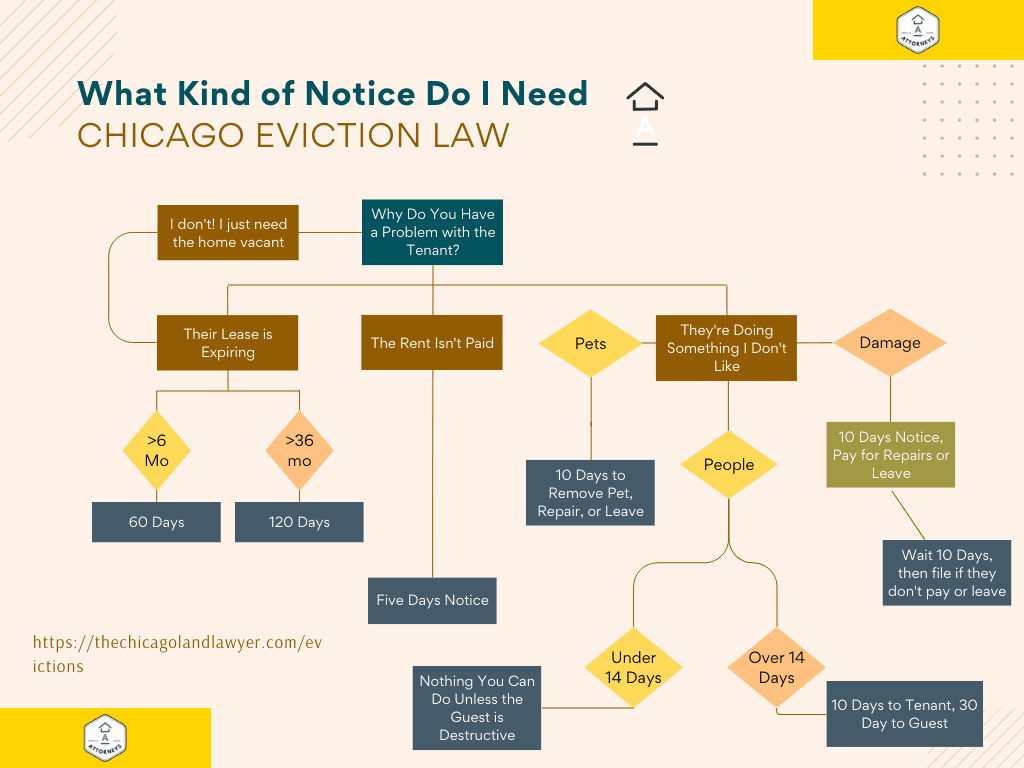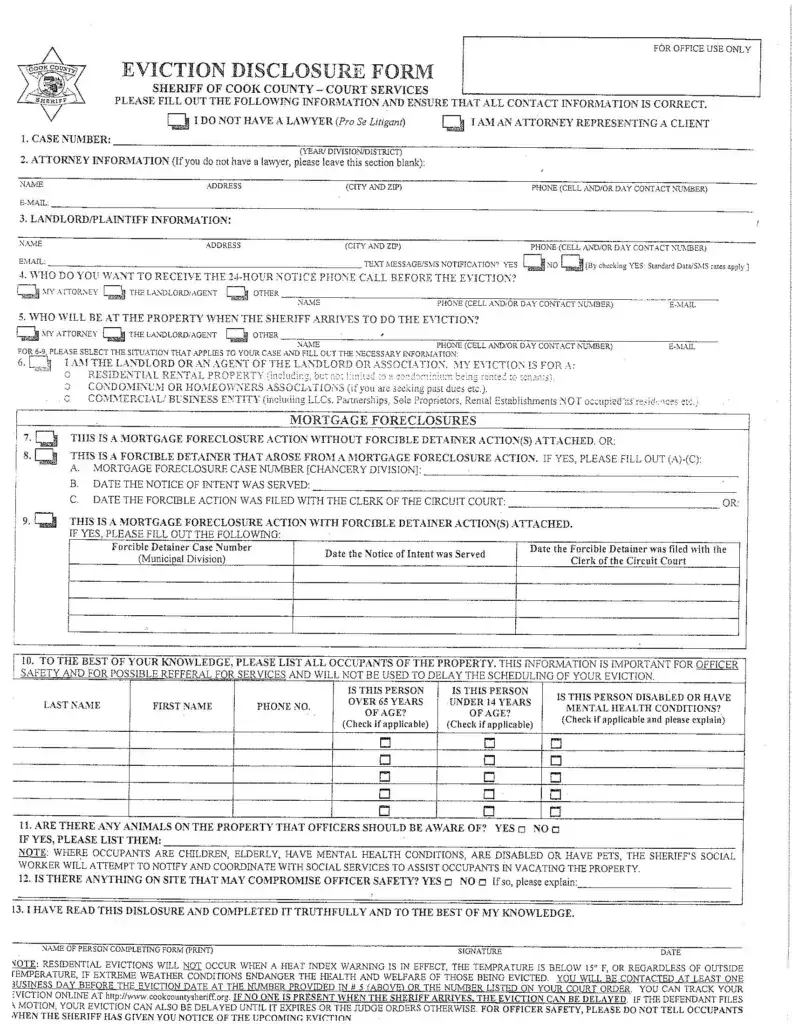As eviction lawyers, we sure know that the eviction process in Chicago is complex and challenging for both landlords and tenants. This article will provide an overview of the key aspects of the landlord-tenant eviction process in Chicago, helping you better understand your rights and responsibilities.

Table of Contents
What are the Legal Grounds for Eviction in Chicago
Before initiating an eviction, landlords must have a valid legal reason. Common grounds for eviction in Chicago include:

- Non-payment of rent – The tenant is behind on rent or a portion of rent. This does not typically include a failure to pay late fees.
- Lease violations or illegal activities – This can include pets, unwanted guests, remodeling, or any other nightmare scenario.
- Expiration of lease term without renewal – Where the tenant fails to move and you need to call an eviction lawyer.
- Property damage or excessive nuisance – Where the tenant just disrespects the property.
What Kind of Notice Do I Need to Evict
Before filing an eviction lawsuit, landlords must provide tenants with a written eviction notice. The type of notice and the required notice period depend on the reason for eviction:
- 5-Day Notice: For non-payment of rent, the landlord must give the tenant a 5-day notice to pay the outstanding rent or face eviction.
10-Day Notice: For lease violations, the landlord must provide a 10-day notice, giving the tenant 10 days to correct the violation or face eviction. Sometimes, the landlord does not have to give a 10-day correction window – like when someone moves in unwanted guests or makes drug-related activity.
30-Day Notice: For evictions without cause (e.g., lease expiration), the landlord must give the tenant a 30-day notice to vacate the property. This is subject to the Fair Notice Eviction Act. For leases in Cook County, any lease longer than 6 months is a minimum 60-day notice to evict OR change the amount due. If the person has resided in the home longer than 3 years, it is 120 days’ notice. This is the only form you can use if the tenant has not misbehaved.
How Do I Deliver The Eviction Notice
Delivering an eviction notice in Chicago is a critical step in the eviction process. As your future eviction lawyer, I need you to know this is the spot where my clients most frequently mess up. It is essential to ensure that the eviction notice is served correctly and according to the law. In Chicago, there are several legal methods for delivering an eviction notice, including personal service, substitute service, abode service, certified mail, and posting.
Get em Out!
Chicago Eviction Lawyers Giving Free Consultations
Personal Service
Personal service is the most straightforward and preferred method for serving an eviction notice. The notice is handed directly to the tenant by the landlord or an authorized process server. As eviction lawyers, this is the method we prefer. Doing it this way ensures that the tenant has received the notice, eliminating any disputes about its delivery.
Does the Tenant need to Sign the Notice?
No. We get asked this question all the time, and it’s the most popular notice-related question we get besides “can I post?” Your affidavit is good enough even if the tenant says they did not receive the notice.
Substitute Service
If the tenant is not available for personal service, substitute service may be used. In this method, the eviction notice is given to a person of suitable age and discretion who resides in the tenant’s dwelling unit. This person is expected to deliver the notice to the tenant. Additionally, the landlord or process server must also mail a copy of the notice to the tenant via first-class mail.
Abode Service
Abode service, also known as “nail and mail” service, can be used ONLY when both personal and substitute service have been unsuccessful. The eviction notice is affixed to the entrance of the tenant’s dwelling unit, ensuring it is visible and secure. A copy of the notice must also be mailed to the tenant via first-class mail. You cannot do this as a first course of action, no matter how many old-timer landlords told you that you can. You should only use this service method when the property seems abandoned, or someone has communicated that the tenant moved out.
One More Time – Can I post Notice?
Only if the property is not occupied, or if you have no idea who is living in it and there are unknown trespassers you have not contacted living in there. If you know your tenant’s first name, you almost certainly should not post.
Certified Mail Service
Serving an eviction notice via certified mail requires the tenant to sign for the delivery, acknowledging receipt of the notice. While this method provides a record of delivery, it may be less effective if the tenant refuses to sign for the mail or is not available to receive it. You need a copy of the green return card for your filing.
Eviction Lawyer Says How to File in Chicago
If the tenant fails to comply with the eviction notice, the landlord or eviction lawyer can proceed to file an eviction lawsuit. These are Forcible Entry and Detainer actions. Courts hear these lawsuits in the nearest municipal region to the home, over Zoom. Only DuPage County really has in-person eviction courts as of April 2023. The landlord, or eviction attorney, has to wait the number of days specified in the Notice. You must show proper service, a proper notice, and attach the most recent lease if it’s available. Yes, even if it’s an expired lease.
Then, the landlord must serve the tenant with a summons to appear in court. In Chicago, you must use the Cook County Sheriff to do this on the first try. The sheriff very frequently fails, and then you’ll need to ask the Court for a special process server. Once the tenant receives the notice, with at least 7 days before a pending court date, you can proceed to ERP and eviction litigation.
Court Hearings and Judgments with an Eviction Lawyer
At the court hearing, both the landlord and tenant will present their arguments and evidence. If the judge rules in favor of the landlord, she will enter a judgment for possession. This allows the landlord to regain possession of the property after 7 days. If the Complaint is a Joint Action Filing, the Court will award some monetary judgment too. All the same, the Court will tell the tenant a specific date by which they must vacate the property.
Enforcement of the Eviction Judgment
If the tenant does not vacate the property by the specified date, things can get ugly. The Cook County sheriff will then execute the order, physically removing the tenant and their belongings from the property. This costs an additional fee of about $200. If you’re going to try the DIY approach, you need to file the proper form with the Sheriff and get 2 certified copies of your judgment (and print two regular ones).

Why Do I Need an Eviction Lawyer?
To put it simply, this process is hard. Everything involved from giving notices to filing the case is very technical. The legislature tried for years to make this process simpler, and it has not succeeded. Moreover, states like Indiana, Arizona and Florida make things so much easier for their landlords. Plus, now that the RLTO is in full force, this just keeps getting more difficult! Absolutely, you don’t want to spend four days of your life in Court. That’s definitely worth less than what it will cost to pay me. I give you all these resources so you can know, for sure, you want to pay someone else to do it.
Get em Out!

